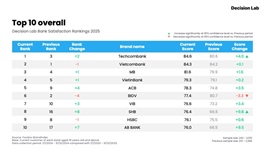Financial sector heats up with strategic M&A moves
Financial sector heats up with strategic M&A moves
Financial sector deals are shifting from traditional dealmaking to mandatory transfers of weak banks and strategic exits from fintech arms, with experts urging insurers to play a central role in bank restructuring.
In its 2025 AGM document released on April 15, lender MB unexpectedly revealed plans to contribute capital, acquire, divest, or adjust its ownership in affiliated entities, resulting in Mcredit no longer being a subsidiary.
MB appears ready to part ways with Mcredit, the consumer finance arm it once had high hopes for. Financial experts believe that MB’s continued withdrawal from its role as the parent company of Mcredit likely marks a key step in its portfolio restructuring strategy.
“MB’s plan to divest from its consumer finance subsidiary is not surprising, particularly as banks enter a phase of operational optimisation and tighten their focus on core businesses,” an analyst told VIR. “In fact, reducing ownership in subsidiaries, especially finance companies, has become a clear trend among banks. This not only frees up capital and improves liquidity, but also allows banks to refocus on core segments such as lending, retail banking, and digital services.”
According to economist Dinh Trong Thinh, attracting foreign capital is a critical step in executing long-term capital increase strategies.
“Banks are under constant pressure to raise charter capital to meet credit growth targets. As a rule, if credit grows at a single-digit rate, capital must grow by at least the same proportion. Foreign partners not only help strengthen financial capacity but also bring management expertise and enhance risk management in line with international standards,” he explained.
Before MB, a similar case occurred at MSB, which plans to submit a proposal to divest from TNEX Finance, formerly FCCOM, a 100 per cent MSB-owned company, at its 2025 AGM scheduled for April 21.
“MSB may seek a strategic partner for partial divestment and long-term collaboration, or a full exit to refocus entirely on its core banking business,” said Nguyen Hoang Linh, CEO of MSB.
This plan remains unresolved for shareholders, five years after MSB’s CEO announced that the bank had signed a deal to sell half of TNEX Finance to a foreign partner. That deal collapsed due to a change in the partner’s business strategy, though compensation was paid to MSB.
In 2022, MSB proposed and secured shareholder approval for the divestment. Linh noted that MSB signed a preliminary MoU with a Japanese partner for a deal valued at over $80 million. However, due to the COVID-19 pandemic, Vietnam’s consumer lending market faced challenges, including a rise in overdue loans, prompting the Japanese firm to reassess its acquisition plan.
In response to shareholders, Linh said MSB, with advisory support from McKinsey, is developing new models while remaining open to investor participation.
Nguyen Cong Ai, deputy CEO of KPMG Vietnam, remarked that finance remains one of the most active sectors for mergers and acquisitions (M&As).
“However, banking-related transactions are no longer progressing as swiftly as before. Banks are more selective with partners, while foreign investors are also restructuring their portfolios amid global capital shifts,” he said. “Vietnam is entering a new era of national advancement. With macroeconomic stability and solid growth momentum, the country is drawing greater interest from global financial institutions.”
Elsewhere, SeABank on April 25 outlined a plan to acquire shares in Asean Securities.
“In addition to core banking operations, the acquisition will allow SeABank to expand its business scope, diversify product offerings, encourage cross-selling, and broaden its distribution channels–particularly to retail clients. This will, in turn, diversify income streams and optimise shareholder capital,” said SeABank’s leadership.
One of the most notable banking M&A developments this year is the government’s approval of mandatory transfers of weak banks, part of a broader restructuring roadmap to stabilise and improve underperforming institutions.
Earlier this year, GPBank was transferred to VPBank and DongA Bank to HDBank. SCB remains under special supervision, with no official resolution yet in place.
According to Dr. Nguyen Tri Hieu, director of the Global Research Institute for Financial and Real Estate Markets, insurance companies play a key role in bank supervision and restructuring.
Drawing from the US experience, Hieu noted that bank mergers and restructurings there occurred under close oversight from federal and state regulators, including the Federal Deposit Insurance Corporation (FDIC), Office of the Comptroller of the Currency, and state financial agencies.
“In Vietnam, insurance companies play no role in bank inspection or restructuring. In the US, the FDIC bears the greatest risk, as if a crisis occurs, they compensate depositors. Because of this exposure, they lead and play the most vital role in supervising banks,” he said. “FDIC reviews capital adequacy, governance, profitability, and interest rates. Meanwhile, bank inspections in Vietnam largely focus on regulatory compliance.”
- 14:36 23/04/2025


























